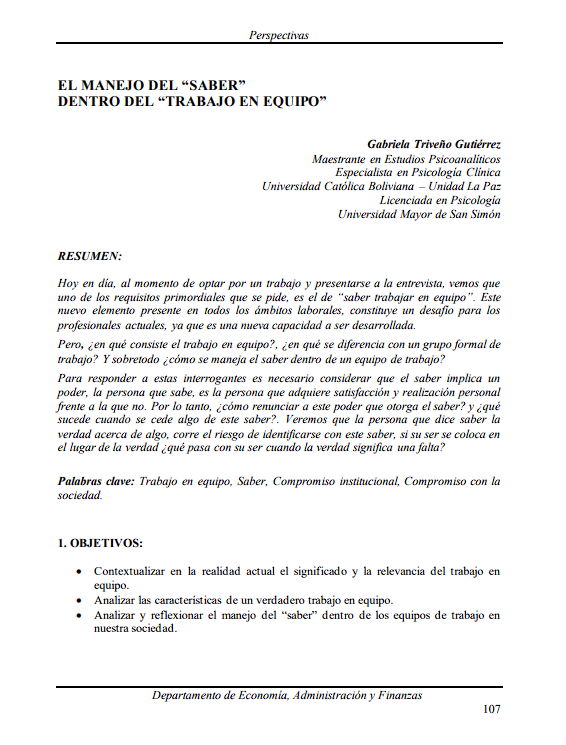El manejo del “saber” dentro del “trabajo en equipo”
DOI:
https://doi.org/10.35319/h8f9va84Palabras clave:
Trabajo en equipo, Saber, Compromiso institucional, Compromiso con la sociedadResumen
Hoy en día, al momento de optar por un trabajo y presentarse a la entrevista, vemos que uno de los requisitos primordiales que se pide, es el de “saber trabajar en equipo”. Este nuevo elemento presente en todos los ámbitos laborales, constituye un desafío para los profesionales actuales, ya que es una nueva capacidad a ser desarrollada.
Pero, ¿en qué consiste el trabajo en equipo?, ¿en qué se diferencia con un grupo formal de trabajo? Y sobre todo, ¿cómo se maneja el saber dentro de un equipo de trabajo?
Para responder a estas interrogantes es necesario considerar que el saber implica un poder, la persona que sabe, es la persona que adquiere satisfacción y realización personal frente a la que no. Por lo tanto, ¿cómo renunciar a este poder que otorga el saber? y ¿qué sucede cuando se cede algo de este saber? Veremos que la persona que dice saber la verdad acerca de algo, corre el riesgo de identificarse con este saber, si su ser se coloca en el lugar de la verdad ¿qué pasa con su ser cuando la verdad significa una falta?
Descargas
Referencias
Evans, Dylan (1997). Diccionario introductorio de psicoanálisis lacaniano. Buenos Aires: Paidós.
Lacan, Jacques (1969). Seminario 17: El reverso del psicoanálisis. Clase 1.
Producción de 4 discursos. Simposio del Campo Freudiano, Buenos Aires.
Lacan, Jacques (1971). Seminario 18: De un discurso que no sería de apariencia. Escuela Freudiana de la Argentina.
Lacan, Jacques (1973). Seminario 20: Aún. Buenos Aires: Paidós.
Lacan, Jacques (1974). Seminario 21: Los incautos no yerran (Los nombres del padre). Escuela Freudiana de Buenos Aires.
Miller, Jacques-Alain (2000). El banquete de los analistas. Buenos Aires: Paidós.

Descargas
Publicado
Número
Sección
Licencia
Derechos de autor 2007 Revista Perspectivas

Esta obra está bajo una licencia internacional Creative Commons Atribución-NoComercial-CompartirIgual 4.0.
La Revista Perspectivas de la Universidad Católica Boliviana, es una revista de acceso abierto, por lo tanto, es de libre acceso en su integridad. Está permitida su lectura, búsqueda, descarga, distribución y reutilización legal en cualquier tipo de soporte únicamente para fines no comerciales, siempre y cuando la obra sea debidamente citada.




